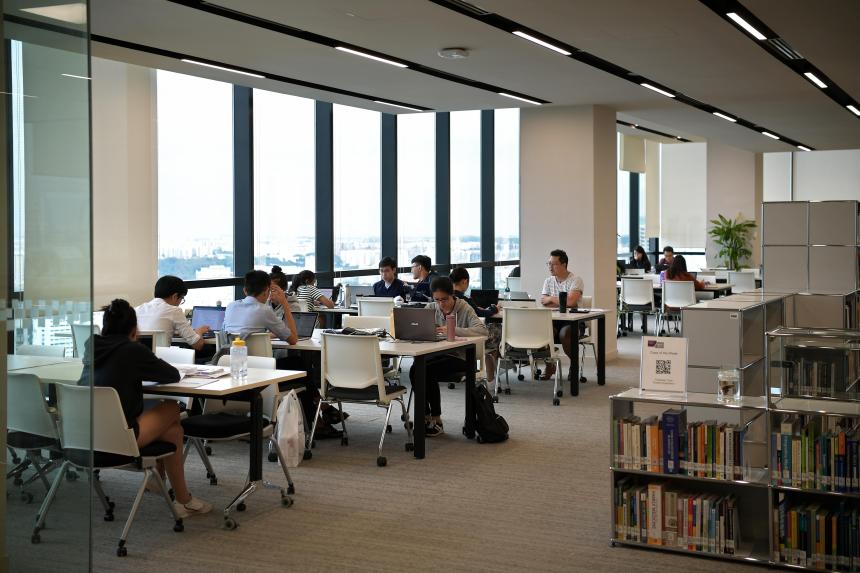SINGAPORE - Most postgraduate programmes that are based on research continue to be subsidised by the Ministry of Education (MOE), which said this is to build up a “broad base of research manpower” for Singapore.
The majority of postgraduate by coursework programmes at the autonomous universities (AUs) are conducted on a self-financed basis, it added.
However, the ministry may provide funding support for certain postgraduate-level qualifications, such as in the areas of public administration and public health. It may also support master’s qualifications that are required for professions like architecture.
These were the main points made by a spokesman for MOE last Friday in response to queries from The Straits Times, following its report on the move by the National University of Singapore (NUS) towards a self-funding model for the majority of its master’s by coursework programmes by 2024.
Coursework programmes are designed for university graduates who want to advance their knowledge in chosen specialisations through courses and electives, while research programmes involve working on an independent research project and submitting a thesis.
The ministry spokesman said: “MOE provides substantial education funding for Singaporeans up to their first degree-level work-ready qualification at the AUs, to support their aspirations and our economy.
“Beyond that, the AUs have the autonomy to decide which programmes they would like to seek MOE funding for, based on considerations such as the viability of offering the programmes on a non-subsidised basis, and may set fees in response to market interest and other considerations.”
The spokesman added that on average, in the academic years (AYs) of 2019 to 2021, Singaporeans made up about 40 per cent of the AUs’ master’s intakes.
Tuition fees for programmes funded by MOE are differentiated to reflect the privileges of citizenship, he said. As of 2019, the ministry had reduced subsidies for permanent resident (PR) students. International students do not receive subsidies, and they pay full fees for most postgraduate by coursework programmes.
Coupled with more coursework-based programmes being self-financed, the annual savings from the reduction in subsidies for foreign students and PRs are channelled towards providing Singaporean and PR adult learners with more bite-size upskilling opportunities that are compatible for work, said MOE, adding that it is working with the institutes of higher learning to ramp up industry-relevant modular courses.
These courses are funded by SkillsFuture Singapore (SSG), at up to 70 per cent of course fees for Singaporeans and PRs, said the spokesman.
For those who wish to take up postgraduate by coursework programmes, the AUs offer graduate scholarships, fee rebates and financial aid to help eligible local students manage the out-of-pocket costs.
A spokesman for NUS said that from AY2023/2024, fresh intakes of Singaporeans and PRs enrolling in a self-funded master’s degree by coursework programme at the university will have a 10 per cent tuition fee rebate. NUS alumni of any nationality will get a 15 per cent rebate.
There may also be additional subsidies, scholarships or study awards, the spokesman said. Singaporeans and PRs can also get SSG funding for selected modules in master’s programmes that are skill-based and in demand for the future economy.
Several master’s degrees by coursework continue to receive subsidies from MOE: the Master of Architecture, Master of Dental Surgery, certain Master of Laws specialisations, Master of Music, Master in Public Administration, Master of Public Health and Master in Public Policy.
Tuition fees for self-funded master’s by coursework programmes at NUS range from $36,000 to $50,000, inclusive of goods and services tax, and students of all nationalities pay the same tuition fees for self-funded programmes.
More than 10,000 students were enrolled in NUS’ master’s programmes – including both coursework and research – in AY2021/2022.
Professor Lee Pooi See, Nanyang Technological University’s (NTU) associate provost for graduate education and dean of its Graduate College, said most of the university’s master’s by coursework programmes are now self-funded, following a revision that began in 2019 to make postgraduate programmes progressively self-financing.
NTU takes in about 4,200 master’s students annually. Its coursework programmes that remain subsidised range from Asian studies and international political economy to civil engineering and information studies.
Prof Lee said about 15 per cent of NTU’s master’s programmes are research-based, and these remain subsidised by MOE.
Singaporeans and PRs can use their SkillsFuture credits for NTU FlexiMasters courses, which are modular courses that are stackable towards a self-funded full master’s degree.
Meanwhile, Professor Timothy Clark, provost of Singapore Management University (SMU), said its Professional Masters programmes, which are based on coursework, have always been self-funding, while its master’s by research programmes are subsidised.
SMU’s annual master’s intake has grown from close to 1,000 in financial year 2017/2018 to more than 1,500 in FY2021/2022.
Its research-based programmes that remain subsidised include the Master of Philosophy in the disciplines of Asian urbanisms, economics, information systems and psychology, said Prof Clark.
“It is our intention to train more talents at the master’s level in these disciplines to meet the industry’s needs. At the same time, SMU aims to nurture a group of young talents and build a pipeline of high-quality master by research candidates who could eventually take on PhD programmes at SMU,” he said.
A spokesman for the Singapore University of Social Sciences (SUSS) said its yearly intake of master’s students has been growing, with 370 of them in the latest batch in 2022.
All of SUSS’ graduate programmes are self-funded, but selected courses may be funded by SSG. The spokesman said that fees for foreign students are about 20 per cent higher than for Singaporeans and PRs.
Master’s programmes at the Singapore Institute of Technology (SIT) and Singapore University of Technology and Design (SUTD) are all subsidised by MOE.
SIT takes in fewer than 100 students for its master’s degrees annually, and SUTD’s average intake of master’s students is about 150 a year.


